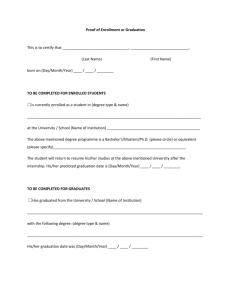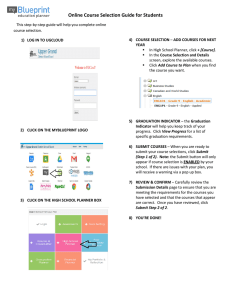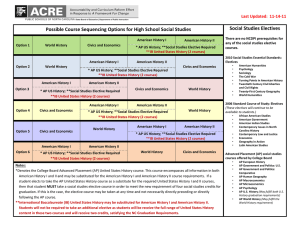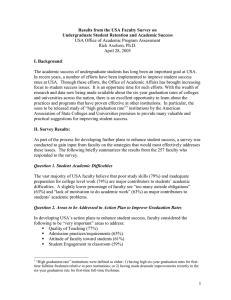Standards and Curriculum Development
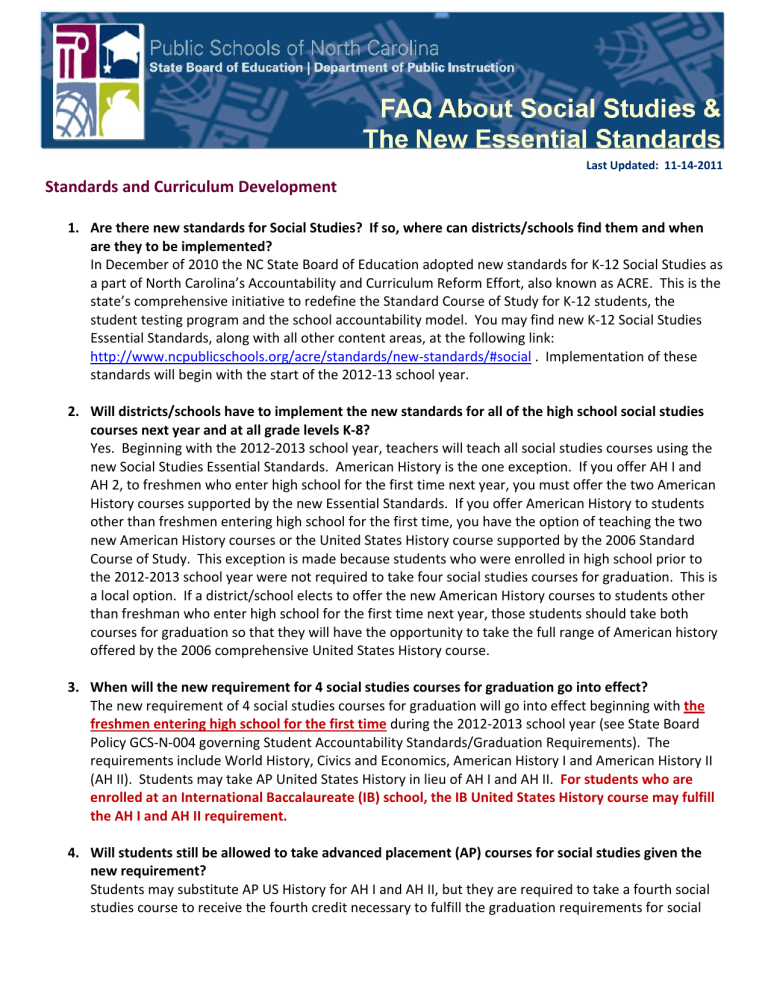
Last Updated: 11 ‐ 14 ‐ 2011
Standards
and
Curriculum
Development
1.
Are there new standards for Social Studies?
If so, where can districts/schools find them and when are they to be implemented?
In December of 2010 the NC State Board of Education adopted new standards for K ‐ 12 Social Studies as a part of North Carolina’s Accountability and Curriculum Reform Effort, also known as ACRE.
This is the state’s comprehensive initiative to redefine the Standard Course of Study for K ‐ 12 students, the student testing program and the school accountability model.
You may find new K ‐ 12 Social Studies
Essential Standards, along with all other content areas, at the following link: http://www.ncpublicschools.org/acre/standards/new ‐ standards/#social .
Implementation of these
standards will begin with the start of the 2012 ‐ 13 school year.
2.
Will districts/schools have to implement the new standards for all of the high school social studies courses next year and at all grade levels K ‐ 8?
Yes.
Beginning with the 2012 ‐ 2013 school year, teachers will teach all social studies courses using the new Social Studies Essential Standards.
American History is the one exception.
If you offer AH I and
AH 2, to freshmen who enter high school for the first time next year, you must offer the two American
History courses supported by the new Essential Standards.
If you offer American History to students other than freshmen entering high school for the first time, you have the option of teaching the two new American History courses or the United States History course supported by the 2006 Standard
Course of Study.
This exception is made because students who were enrolled in high school prior to the 2012 ‐ 2013 school year were not required to take four social studies courses for graduation.
This is a local option.
If a district/school elects to offer the new American History courses to students other than freshman who enter high school for the first time next year, those students should take both courses for graduation so that they will have the opportunity to take the full range of American history
offered by the 2006 comprehensive United States History course.
3.
When will the new requirement for 4 social studies courses for graduation go into effect?
The new requirement of 4 social studies courses for graduation will go into effect beginning with the freshmen entering high school for the first time during the 2012 ‐ 2013 school year (see State Board
Policy GCS ‐ N ‐ 004 governing Student Accountability Standards/Graduation Requirements).
The requirements include World History, Civics and Economics, American History I and American History II
(AH II).
Students may take AP United States History in lieu of AH I and AH II.
For students who are enrolled at an International Baccalaureate (IB) school, the IB United States History course may fulfill the AH I and AH II requirement.
4.
Will students still be allowed to take advanced placement (AP) courses for social studies given the new requirement?
Students may substitute AP US History for AH I and AH II, but they are required to take a fourth social studies course to receive the fourth credit necessary to fulfill the graduation requirements for social
studies.
Students may continue to substitute AP World History for the World History requirement.
Additionally, students are still allowed to take other social studies AP courses as elective courses.
5.
Will the old electives courses still be available?
In addition to the eight new elective courses, district/schools will still be able to offer the elective courses supported by the 2006 SCOS with the exception of Psychology, Sociology, and Geography because they have been revised using the Essential Standards Framework.
Until the old electives are revised, they will continue to be offered.
6.
Why are students only receiving 1 credit for AP US History when they will receive 1 credit each for taking USH I and USH II?
AP courses are intended to be more rigorous and structured to resembling what students would receive in a college level course.
While the content covered is the same for both courses, the College
Board designed the AP course to be one course and therefore it receives only 1 credit.
Because of the rigor and pace, students who meet all of the requirements of the course will receive additional quality points in their GPA calculation.
7.
Who develops the curriculum for social studies?
The NCDPI is responsible for developing the Standard Course of Study (SCOS) for all content areas.
Each
Local Education Agency (LEA) is responsible for using the SCOS as the basis for developing its local curriculum.
Additionally, NCDPI will provide options for sequencing, unit develop resources, etc.;
however, it is up to each LEA to determine specific content for which students will learn at each grade level and for each course.
For those districts that need more specific assistance, professional development will be provided.
You should contact your NCDPI Professional Development Regional
Leader.
You may find their contact information at http://www.ncpublicschools.org/profdev/directory/
Assessment
1.
Will there be an End ‐ of ‐ Course (EOC) test for United States History courses?
If so, when would it be administered?
Pursuant to Session Law 2011 ‐ 8 House Bill 48: No Standardized Testing Unless Req’d by the Feds., there will be no End ‐ of ‐ Course testing for American History or Civics and Economics effective during the 2011 ‐ 12 school year.
For specific questions regarding standardized testing contact Jim Kroening at jim.kroening@dpi.nc.gov




